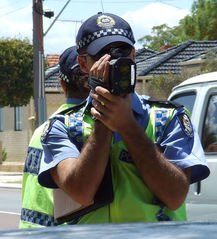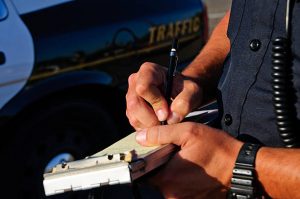 In the past few years, the Illinois Legislature has enacted laws which make Excessive Speeding a much more serious matter than most people think. Most people are conditioned to believe that if they are pulled over for speeding they will receive a simple speeding ticket and the most that could happen to them is that they have to pay a steep fine and take a Traffic School class. The recent changes to the speeding laws have made certain Excessive Speeding tickets an actual crime. From all of the calls that I get from prospective clients, this area of the criminal law may be one of the most misunderstood subjects.
In the past few years, the Illinois Legislature has enacted laws which make Excessive Speeding a much more serious matter than most people think. Most people are conditioned to believe that if they are pulled over for speeding they will receive a simple speeding ticket and the most that could happen to them is that they have to pay a steep fine and take a Traffic School class. The recent changes to the speeding laws have made certain Excessive Speeding tickets an actual crime. From all of the calls that I get from prospective clients, this area of the criminal law may be one of the most misunderstood subjects.
If you are caught speeding 26 to 34 miles per hour over the posted speed limit, you will be charged with a Class B Misdemeanor. A Class B Misdemeanor for speeding 26 to 34 miles per hour over the posted speed limit carries a maximum punishment of 180 days in County Jail and a maximum fine of up to $1,500. If you are caught speeding 35 miles per hour, or over, the posted speed limit, you will be charged with a Class A Misdemeanor. A Class A Misdemeanor for speeding 35 miles per hour over the posted speed limit carries a maximum punishment of up to one year in County Jail and a maximum fine of up to $2,500. So, if you are pulled over for speeding 26 miles per hour, and over, the posted speed limit, you will not receive a simple speeding ticket. You will be arrested and charged with a crime which carries a potential jail sentence. In addition to any possible criminal penalties, a conviction for speeding 26 miles per hour over the posted speed limit may result in the suspension of your driver’s license by the Illinois Secretary of State. A conviction for Excessive Speeding will remain permanently on your driving record with the Secretary and will appear as a criminal conviction in a routine background search. Not only will a prospective employer find out that you have been convicted of a crime, but your insurance company may use this conviction to drop you from their Auto Insurance plan or increase your insurance premiums.
Yesterday, the Illinois Department of Transportation greeted local motorists with some good news which may help reduce the number of Excessive Speeding cases that could lead to a criminal conviction and a potential jail sentence. Up until now, the speed limit on I-90 west of Elgin was 70 miles per hour all the way to Wisconsin. Yesterday, the Illinois Department of Transportation announced that the speed limit from Randall Road in Elgin to Mount Prospect Road has been increased to 70 miles per hour for all passenger cars. The new speed limit matches the 70 mile per hour speed limit from Elgin to Wisconsin. The previous speed limit from Randall Road in Elgin to Mount Prospect Road was 55 miles per hour.
 Chicago Criminal Lawyer Blog
Chicago Criminal Lawyer Blog


 In the past several weeks, I have spoken to several clients who were arrested for Aggravated or Excessive Speeding and were charged with a crime. Most of the people I spoke to did not realize that they could be arrested for speeding. Many people do not understand the Illinois speeding laws and how a simple speeding ticket can lead to you being arrested and facing the real possibility of having a criminal conviction appear on your record and a possible jail sentence in your future. I want to take this opportunity to try to help people understand just how drastic the consequences of a speeding ticket in Illinois can be.
In the past several weeks, I have spoken to several clients who were arrested for Aggravated or Excessive Speeding and were charged with a crime. Most of the people I spoke to did not realize that they could be arrested for speeding. Many people do not understand the Illinois speeding laws and how a simple speeding ticket can lead to you being arrested and facing the real possibility of having a criminal conviction appear on your record and a possible jail sentence in your future. I want to take this opportunity to try to help people understand just how drastic the consequences of a speeding ticket in Illinois can be. Recently, I have represented clients who received speeding tickets. In the course of representing these clients, I have come to realize that people do not really understand the Illinois Speeding Laws. In the last few years, the Illinois speeding laws have been changed. The changes have drastically increased the penalties for excessive speeding on Illinois roadways. Drivers are not adequately informed of what the potential consequences can be for a speeding ticket.
Recently, I have represented clients who received speeding tickets. In the course of representing these clients, I have come to realize that people do not really understand the Illinois Speeding Laws. In the last few years, the Illinois speeding laws have been changed. The changes have drastically increased the penalties for excessive speeding on Illinois roadways. Drivers are not adequately informed of what the potential consequences can be for a speeding ticket. The Public Safety Committee for the Village of Schaumburg has recommended that the Village of Schaumburg allow police officers to write local Municipal Violation tickets for first-time negligent driving offences. The measure is intended to go after drivers who are using hand-held cellphones while they are driving instead of hands-free devices. Village officials claim that the judges at the Rolling Meadows Courthouse are taking these tickets too lightly and not punishing offenders enough.
The Public Safety Committee for the Village of Schaumburg has recommended that the Village of Schaumburg allow police officers to write local Municipal Violation tickets for first-time negligent driving offences. The measure is intended to go after drivers who are using hand-held cellphones while they are driving instead of hands-free devices. Village officials claim that the judges at the Rolling Meadows Courthouse are taking these tickets too lightly and not punishing offenders enough. The Arlington Heights Police Department has announced that they will have a Traffic Enforcement Campaign in place from June 26 to July 9, 2017. The Traffic Enforcement Campaign coincides with the upcoming Fourth of July weekend. The Traffic Enforcement Campaign will check motorists and vehicles for seatbelt violations, DUI driving, and a roadside safety checkpoint. The first roadside safety checkpoint will take place on June 28th on Arlington Heights Road just south of Algonquin Road. A roadside safety checkpoint is a way that the police can look inside your vehicle and pull you over to the side if they smell something, or see something inside the car, or suspect that the driver is up to no good. What the Arlington Heights Police are planning on doing this weekend is commonly known as a “Police Roadblock.” The Arlington Heights Police will be looking for people that are not wearing their seat belts and are Driving Under the Influence of Alcohol or Drugs. The enforcement campaign is being paid for with Federal Traffic Safety Funds and administered by the Illinois Department of Transportation.
The Arlington Heights Police Department has announced that they will have a Traffic Enforcement Campaign in place from June 26 to July 9, 2017. The Traffic Enforcement Campaign coincides with the upcoming Fourth of July weekend. The Traffic Enforcement Campaign will check motorists and vehicles for seatbelt violations, DUI driving, and a roadside safety checkpoint. The first roadside safety checkpoint will take place on June 28th on Arlington Heights Road just south of Algonquin Road. A roadside safety checkpoint is a way that the police can look inside your vehicle and pull you over to the side if they smell something, or see something inside the car, or suspect that the driver is up to no good. What the Arlington Heights Police are planning on doing this weekend is commonly known as a “Police Roadblock.” The Arlington Heights Police will be looking for people that are not wearing their seat belts and are Driving Under the Influence of Alcohol or Drugs. The enforcement campaign is being paid for with Federal Traffic Safety Funds and administered by the Illinois Department of Transportation.